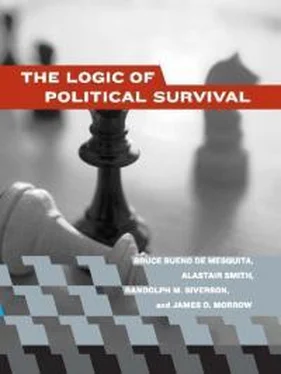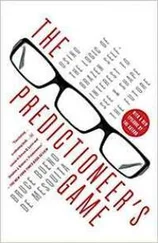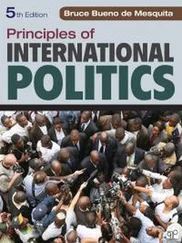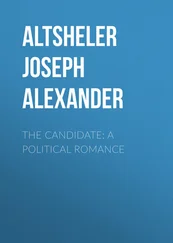Human history is a mix of evolutionary change punctuated with revolutions. Slaves, always in the disenfranchised group, have largely disappeared as an identifiable category of people. In ancient Greece almost no one was a member of the selectorate; almost everyone was a slave or nearly so. By the Middle Ages, feudal customs had greatly eroded the ancient sense of slavery. Still, the disenfranchised group remained overwhelmingly large, being the great majority. Serfs and free men may not have been true slaves, but they were not participants in the choice of leaders and they had no prospect of becoming leaders themselves so long as the existing political arrangements remained unaltered.
One revolutionary feature of the Magna Carta (1215), or Castile and León’s Espéculo forty years later, was that each suggested the extension of consequential political rights—including due process of law—to all free men. Here was a proposal that held out the prospect of an evolutionary expansion of the selectorate so that more and more members of the society would also become part of the political process. This idea, however, was set aside in England when King John, with the pope’s support, reneged on the Magna Carta’s major proposals for political change. Likewise, the Espéculo was observed more in the breach than in reality in the Spanish kingdoms. Some of the ideas in these important documents returned with greater force in 1297 when England’s King Edward I reluctantly signed Confirmatio Cartarum , promising to bind himself and future kings to seek the approval of the commons before levying new taxes. Similar ideas are found even earlier, perhaps as early as 1255, in Castile and León, and soon followed suit in many other kingdoms of Europe (O’Callaghan 1989). Though a beginning, still many centuries passed before the commons or the townspeople truly were incorporated into the group of people—the selectorate—who have a prospect of rising to positions of influence in government or of gaining access to the private largesse that governments dole out.
By the seventeenth century—if not earlier—the proportion of the population that was disenfranchised began to shrink noticeably as propertied people increasingly gained access to participation in government. Birth into the nobility was no longer the only—perhaps not even the main—source of access to the selectorate in some parts of the world. Still, the vast majority of residents in each polity remained disenfranchised. The American Revolution represented an early experiment in the further expansion of the selectorate and the reduction in numbers of the disenfranchised, though still the majority of any nation’s residents remained outside the selectorate. In the late nineteenth and early twentieth centuries, as democracies extended the vote to women and with the virtual universal elimination of property tests for voting, at least some political systems made the transition to a condition in which the disenfranchised included basically only children. No political system has yet expanded the citizenry to include children, so that those roughly under eighteen—even fifteen in Iran—appear to be the final bastion of the disenfranchised in contemporary democracies. In some parts of the world, the disenfranchised remain the largest group of people as the seemingly evolutionary process of enfranchisement continues.
The consequential effect of N in the selectorate theory is to establish the scale of each polity. The scale has two important effects in the models. The larger the scale of a society, the higher the absolute cost of providing public goods. For example, it costs considerably more, even taking economies of scale into account, to educate 100 million people than 10 million. Additionally, the society’s scale sets the number of people who can be taxed by the state and therefore the magnitude of resources that could be extracted through taxation.
For the purposes of our analyses we essentially normalize the scale effects by fixing N in the theoretical analysis. This is intended to emphasize that the size of the coalition and the selectorate must be evaluated relative to the size of the total population. Thus, while the winning coalition, defined below, in contemporary China includes many more people than does the winning coalition in Belgium, still Belgium’s winning coalition, as a proportion of the population, is vastly larger than China’s.
The Selectorate ( S )
Politics involves a seemingly infinite variety of institutional details. Though we commonly speak of only a handful of regime types, such as democracy, monarchy, autocracy, junta, or oligarchy, no two political systems are identical. 3We believe, however, that the infinite variety of real-world institutional arrangements can be distilled into just two critical dimensions: the selectorate and the winning coalition. By mapping a diverse set of political considerations onto the two dimensions of selectorate size and winning-coalition size, we sacrifice detail and precision, but gain the possibility of explaining a rich variety of political phenomena with a relatively simple theoretical structure. We also gain the possibility of mapping all nominal regime types onto a continuous two-dimensional space, creating an opportunity to integrate insights from democratic theory and from theories of autocracy, totalitarianism, monarchy, and military rule into a single analytic framework.
Though members of the selectorate (denoted S ) have a government-granted say in the selection of leaders, this is not their most important or meaningful characteristic. It is, however, their most easily discerned characteristic. The important aspect of being in the selectorate is that membership conveys the opportunity to become a member of a winning coalition. To be sure, membership in the selectorate does not necessarily make the prospects of joining a winning coalition good, but it does raise those prospects above zero and, in democracies, up to levels as high as 50 percent.
We define the selectorate as the set of people whose endowments include the qualities or characteristics institutionally required to choose the government’s leadership and necessary for gaining access to private benefits doled out by the government’s leadership. All selectorate members within a polity, therefore, share certain common characteristics. Those characteristics, however, can differ across political systems, so that an individual can qualify for selectorate membership in one polity and yet have no possibility of qualifying in another.
Polities can be characterized by more-or-less formalized mechanisms that allow some people to have the prospect of gaining access to valued goods dispensed by government while excluding others from even the chance of such access. Access to such valued goods is a fundamental quality of membership in the winning coalition, a concept we define and discuss in the next section. Membership in the selectorate is a necessary condition for membership in a winning coalition.
One function of political rules and institutions is to distinguish the subset of residents who possess the characteristics required for membership in the selectorate. More loosely, selectorate membership identifies those who meet the polity’s criteria for enfranchisement or, still more colloquially, citizenship. The qualities generally used to sort people into and out of the selectorate vary in terms of their inherent scarcity and in terms of the extent to which they can be created, transferred, or assigned to people, so that their scarcity is subject to political manipulation. That is, scarcity can be a function of insurmountable barriers, like birthplace, or of artificial barriers, like restricted entry into certain professions. The greater the scarcity of a required quality, whether that scarcity is natural or artificial, the smaller will be the selectorate. We suggest a list of such qualities and discuss their inherent or politically manipulated scarcity. The qualities we identify have found common usage throughout history, but they may not be exhaustive. It is sufficient for our purposes to identify these few key qualities so as to clarify what we mean by the selectorate.
Читать дальше












